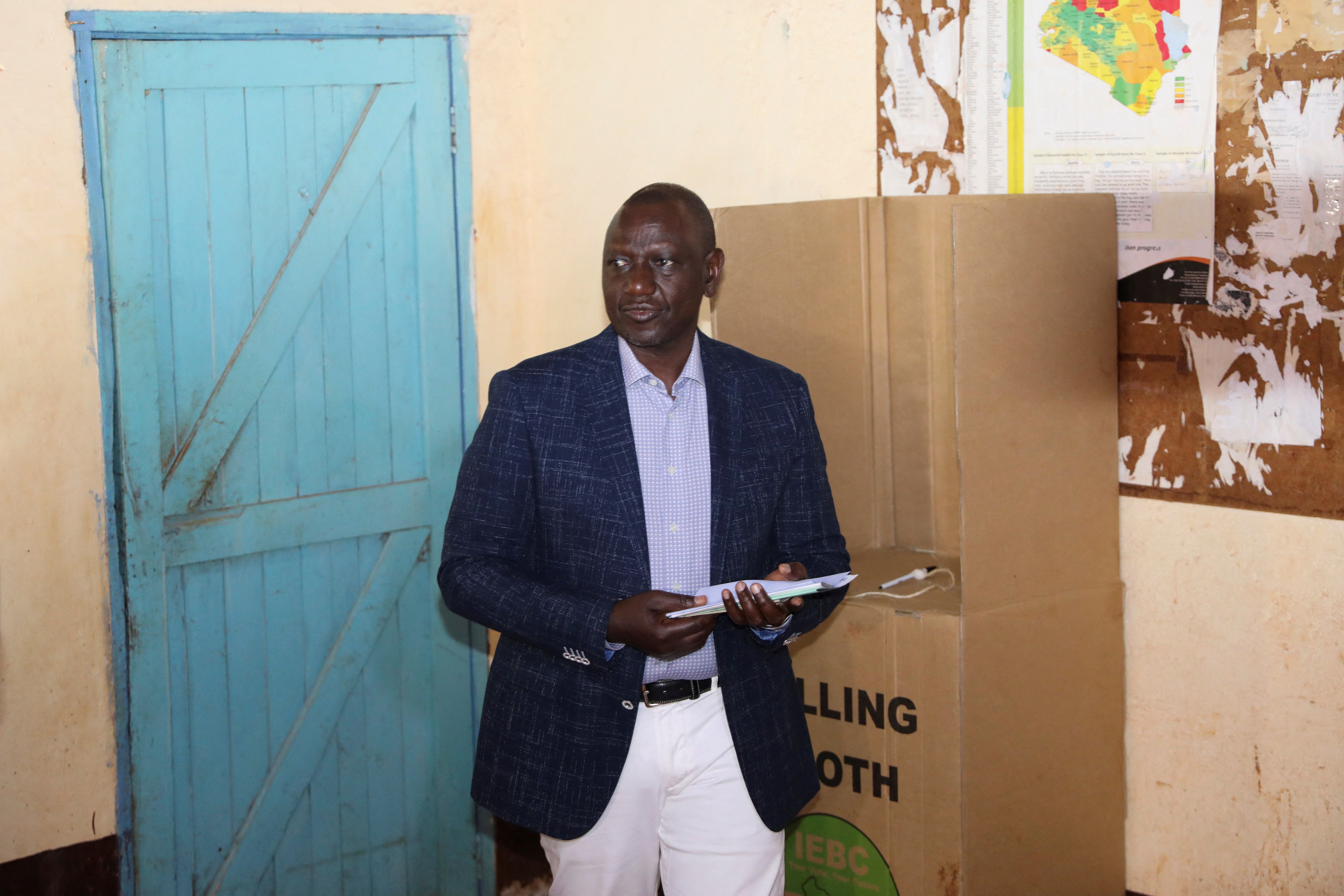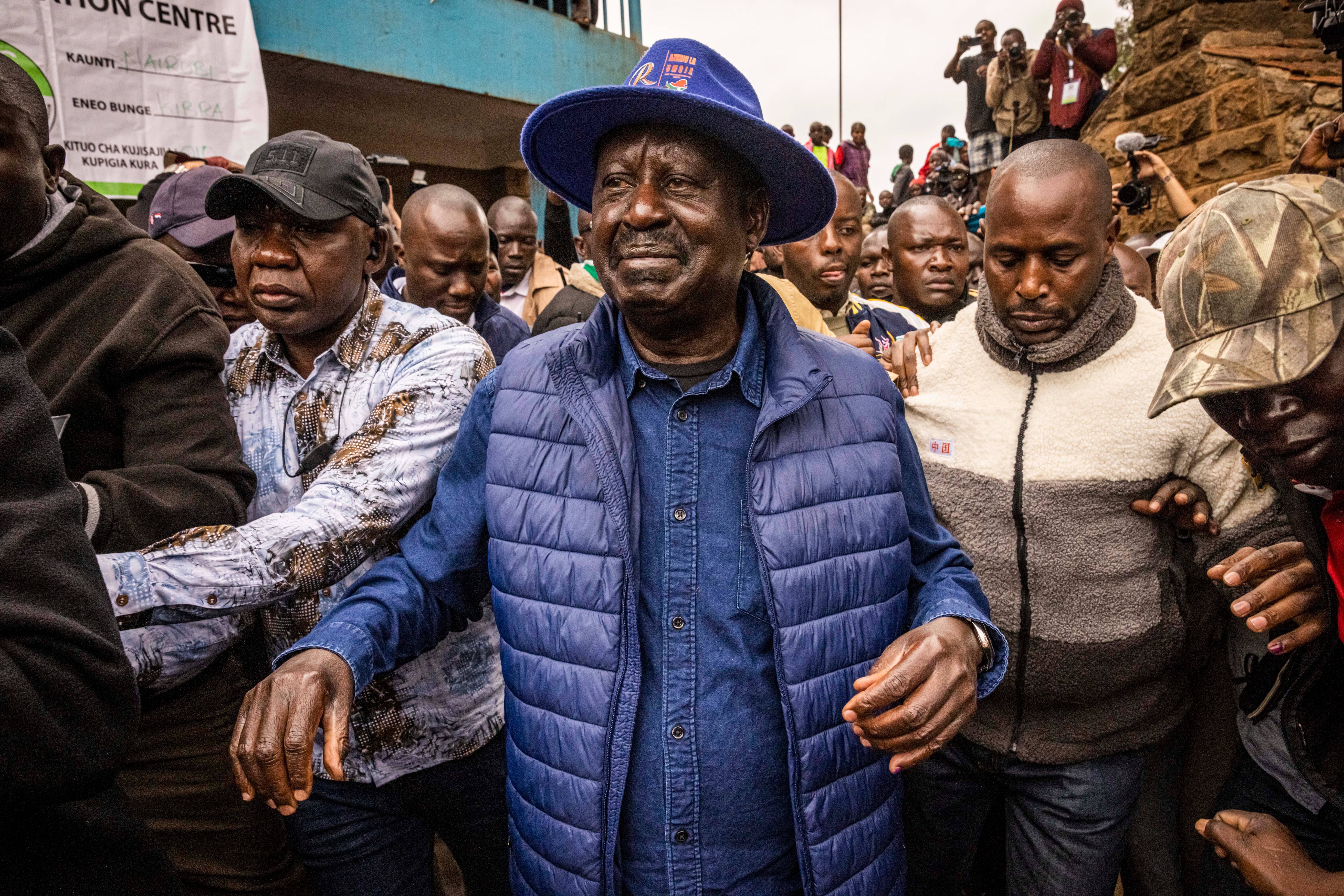‘We don’t have good choices’: Underwhelmed Kenyans head to polls in narrow presidential race
Pollsters predict Raila Odinga will narrowly beat William Ruto, but many voters in the country remain uninspired by either candidate

Kenyans headed to the polls on Tuesday to elect a new president in a closely-fought contest between two political veterans.
With the outgoing leader Uhuru Kenyatta stepping down after reaching the two-term constitutional limit, the former deputy prime minister Raila Odinga and the current deputy president William Ruto lead the race to succeed him.
Mr Odinga, 77, has failed in his four previous attempts to win the presidency, but hopes that the backing of Mr Kenyatta will allow him to succeed this time around.
Meanwhile, his rival, 55-year-old Mr Ruto, has billed himself as the champion of the “hustler nation”, promising to deliver a brighter future for young people.
The most recent opinion polls gave Mr Odinga the edge over his opponent, but Mr Ruto dismissed the projections as baseless.
While heading to the ballot box on Tuesday morning, both candidates expressed their confidence that they would win.
“In moments like this is when the mighty and the powerful come to the realisation that it is the simple and the ordinary that eventually make the choice,” Mr Ruto said.
“I look forward to our victorious day,” he added.
Mr Odinga had a similar message en route to a voting centre. “I have confidence that the people of Kenya are going to speak loudly in favour of democratic change,” he said.
Reports from around the country suggested that voting queues are shorter than they were in previous elections, but it remains unclear if voter turnout will ramp up later on Tuesday.
Joshua Nyanjui, who lives in Naivasha, a town northwest of the capital Nairobi, told Reuters that he only had to wait for 30 minutes to cast his vote this year, far shorter than the four hours he spent in a queue in 2013.
“Kenyans are tired of waking up early and voting for a government that doesn’t care, but we hope things will change,” he said.
The east African country’s electoral commission confirmed that fewer young people had registered to vote than it had expected. Some 22.1 million people are eligible to cast their vote.

Some analysts said people’s disillusionment with the economy and widespread corruption could dampen voter turnout. Both Mr Odinga and Mr Ruto have pledged to ease the cost of living crisis, which has seen food and fuel prices spiral in recent months, as well as promising to tackle graft.
The electorate’s other main concerns include the country’s burden of debt, which stands at 67 per cent of GDP, and widespread unemployment, with 40 per cent of young people currently out of work.
“The problems from 2017, the economy, the day-to-day life, are still here,” said Adrian Kibera, a shopkeeper who said he would not be voting in the election.
“We don’t have good choices,” he told the Associated Press, describing Mr Odinga as too old and Mr Ruto as too inexperienced.
Ethnic factors could also reduce the number of votes cast, as neither frontrunner comes from the Kikuyu group, the largest in the country. This is the first time that a Kikuyu candidate has not been a leading contender in a Kenyan presidential election.
However, both Mr Odinga and Mr Ruto have chosen Kikuyu deputies, with the former widely praised for choosing the former justice minister Martha Karua as his running partner. She would become the first woman to hold the post of deputy president if their campaign is successful.

It is hoped that this election will not be marred by violence or controversy, as some previous votes have been.
After Mr Odinga publicly challenged his defeat in 2007, tensions boiled over and more than 1,200 people killed in the ensuing violence.
Along with the outgoing president, Mr Ruto faced an International Criminal Court trial after being charged with orchestrating the post-election violence in 2007. The case was dropped in 2016 after the Kenyan government refused to cooperate with prosecutors.
In an electoral first, the results of the 2017 election were overturned by the high court after Mr Odinga questioned the validity of his defeat. The political crisis abated after he reached a deal with Mr Kenyatta.
Tuesday’s vote will finish at 5pm local time, but the final results will not be known until later this week. To win outright, a candidate needs to gain more than 50 per cent of all votes. If this threshold is not met, a run-off election will take place.



Join our commenting forum
Join thought-provoking conversations, follow other Independent readers and see their replies
Comments